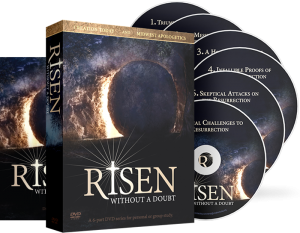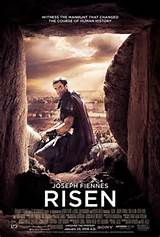
Poster image of the excellent new movie, Risen.
Readers of this blog know my passion for talking and writing about the Resurrection of Jesus Christ. So it should come as no surprise that the Risen movie will garner attention here. I have already reviewed the novel and written a lengthy non-spoiler review for Answers in Genesis after twice viewing an advance copy.
I have now seen the movie in the theater and talked to many others who have seen it. I’ve mentioned before that the film has a few inaccuracies related to timing and location, but I didn’t want to give away any spoilers so my comments were somewhat generic. Now that others have seen it, I want to briefly discuss some of the minor inaccuracies as well as defend the film from some false allegations.
*****************************
SPOILER ALERT: If you read the rest of this post, you will read spoilers. You can read my non-spoiler review here.
*****************************
Claim #1: It should only show what the Bible mentions
While this may sound like a worthy objection, showing only what the Bible mentions would not necessarily make for a good film. This is not at all an attack on Scripture. The books of the Bible were written in certain genres, but “screenplay” was not one of them. There are certain ways to tell a story on the big screen, and as great as it would be to see the Bible come to life in that way, you would still have the same problem.
This objection really boils down to the person wanting to guard against the addition of extra-biblical details, but this is impossible to avoid if one is going to make a film about a biblical event. The look, sound, and dress of any character will necessarily be extra-biblical. This has led some people to claim that no film should ever be made about the Bible, but I believe that response neglects one of the most powerful tools we have today to reach people. In many ways, movies are the language of our culture, so why not use the medium to share the gospel?
Claim #2: The number of guards shown at the tomb is wrong
The movie shows two guards at the tomb. They were already tired from working a previous night, and one of them admits that they took turns sleeping that night. In reality, there were more than two guards. It may have been four soldiers, but more likely the word referred to a group of sixteen guards.
Matthew 28:11 states that “some of the guard” went into the city to report to the chief priests what had happened. The “some” referred to more than one guard, but obviously not all of them. So since at least one did not go into the city, we know there were more than two soldiers. So the film gets this point wrong, but they did an excellent job with the two soldiers that they had. One of the most dramatic scenes in the movie occurs when Clavius catches up with one of the soldiers in a tavern and the guard explains what he saw.
Claim #3: The stone was too far away from tomb
One of the complaints I have heard had to do with the location of the stone after the tomb was opened along with the condition of the ropes. The movie shows the stone moved about twenty feet or so away from the mouth of the tomb and lying down. The ropes are snapped rather than cut, and the wax seals melted. Is this really inaccurate?
The Bible simply does not give enough information one way or the other. The condition of the ropes makes good sense since it doesn’t seem as if an angel would need to cut the ropes. Who knows what would happen to the seals if an angel rolled away the stone? Also, the stone was rolled away according to Matthew 28:2, but it doesn’t say how far away. It also tells us that the angel sat on the stone, but he could have sat on an upright or horizontal stone. Nothing in the text precludes the way the movie depicts it, so this objection is really just a complaint because it doesn’t match one’s own preconceptions.
Claim #4: The Bible says a Roman wasn’t present at the post-Resurrection events
In the film, Clavius eventually finds the disciples, and he’s in for quite a shock. Jesus is sitting in their midst, and Thomas soon joins them. There are some inaccuracies with this scene. The movie shows it happening about four days after the Resurrection, but John 20:26 has it eight days later. John also tells us that Thomas was already present with the disciples and the room’s doors were shut when Jesus appeared in their midst. The movie has Thomas joining them after Jesus already appeared and the door is opened because Clavius had entered.
Does the Bible rule out the possibility of a Roman soldier seeing Jesus? Not at all. It doesn’t tell us specifically that He appeared to one, but it does tell us that He appeared to over 500 people at once. Maybe one or more were Roman soldiers. There probably was not a Roman at the appearance where Thomas saw Him (since the doors were shut), but it isn’t completely ruled out. The Bible also tells us in Acts 6:7 that a great many of the priests became obedient to the faith. While it doesn’t tell us that Jesus appeared to them, it is not hard to think that some of them may have been witnesses. Simply put, the Bible does not rule out someone like Clavius being present for some appearances. The Bible doesn’t give complete details of many scenes so works of historical fiction like Risen can use the scenes and still be compatible with Scripture (if done properly).
Claim #5: Barabbas should not have been killed in the opening battle
The brief, but deadly battle outside Jerusalem at the beginning of the movie concludes with Clavius killing Barabbas. And since this is taking place on the day Jesus was crucified, it seems inconsistent since Barabbas would have been set free by Pilate that day.
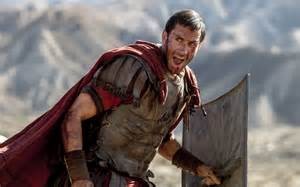
Joseph Fiennes plays Clavius, seen here leading his troops into battle against some zealots.
The first two times I watched the film, I forgot to pay close attention to see if they said it was actually Barabbas that was killed in the scene because I knew how the novel had portrayed the scene. The third time I watched, I saw that the man was clearly supposed to be Barabbas. But this is not inconsistent. In fact, it actually makes a lot of sense and I appreciate the way the filmmakers did this. After being set free, it is not hard to imagine Barabbas quickly joining his fellow zealots, and perhaps some soldiers tailed him so that they could find the zealots, which leads to the encounter that is not mentioned in Scripture. Since the movie has the battle taking place while Jesus is on the Cross then there is no inconsistency here.
Claim #6: The location of the Ascension is wrong and they didn’t finish the scene
These claims are accurate. The movie definitely seems to portray the Ascension as being somewhere in Galilee rather than outside of Jerusalem at the Mt. of Olives. This was one of the timing/location errors I alluded to in my spoiler-free review, but I didn’t want to mention in that article that Clavius meets the risen Savior since that would spoil the “detective story” that dominates the first half of the movie.
Also, the film did not show the angels after the scene. This isn’t really an error as much as it is just incomplete. For example, no conservative Christian would say that the Apostle John made a mistake in his Gospel because he never mentioned that Peter walked on water too. John only mentions Jesus walking on water and then getting into the boat (John 6:15–21). This isn’t an error. It is the nature of historical reporting as certain details end up being skipped. Matthew 14:22–33 fills in the details for us. So it is not inaccurate for the film to end the scene before seeing angels. It would have been cool to see them, but maybe the filmmakers weren’t sure how to accurately depict them.
Claim #7: Mary Magdalene was depicted as a prostitute
This was another point I made in my non-spoiler review. It was unfortunate that the film portrays Mary as a former prostitute, since this popular view is not spelled out in Scripture. The error apparently dates back to AD 591 when Pope Gregory conflated the sinful woman of Luke 7 (traditionally thought to have been a prostitute) who washed Jesus’ feet with her tears with Mary Magdalene, who is first mentioned a few verses later (Luke 8:2).
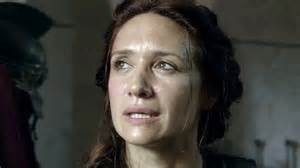
Unfortunately, Mary Magdalene, though wonderfully played by Maria Botto, is shown as a prostitute, following a common stereotype.
Luke tells us that Jesus had cast seven demons from Mary Magdalene, and it is possible that she was a prostitute, but the Bible doesn’t tell us that.
It would have been nice for the film to break away from that stereotype. Also, the film is a little ambiguous about whether Mary was still involved in that lifestyle, and it definitely implies that she had been a prostitute shortly before the events of the film took place, since nearly all the soldiers in the barracks admit to knowing her. Yet Mary had been a faithful follower of Jesus for some time before these events. [Update on 10/10/16 – As Tom points out in the comment section below, Mary does tell Clavius that this was her “former life,” so the film is not really ambiguous about her no longer being involved in those activities. Thanks Tom!]
Claim #8: It puts words in the mouth of Jesus
There is no denying that the movie gives the character of Jesus lines that are not spoken in Scripture. This fact alone has made some people dislike the movie. While it is certainly a dangerous proposition to do something like this in a film, I think Risen handled this very carefully because they had him speaking very little, even though they had him in the film a fair amount. The real key to doing something like this is to make sure that the actor of Jesus does not say anything out of character with what the Son of God really did say. I can’t think of anything in the movie that would have been out of place (the next point will look at one example I have heard people cite).
Those who complain about this point need to be careful about making too much of this claim since it is very possible that they have done the same thing. Have they ever cited Christ’s words to the woman who was caught in adultery (“Go and sin no more”) in John 8? That passage is probably not original to John’s Gospel (see note before John 7:53 in most Bibles). Similarly, the Lord’s beloved lines from the Cross in Luke 23:34 (“Father, forgive them, for they do not know what they do”) are not supported by the majority of the best manuscripts. He may have said these things, but if He did not, then isn’t it possible that people who cite these verses are putting words in His mouth?
Claim #9: It had Jesus saying something wrong or that He would probably never say
Another complaint is that the character of Jesus in the film allegedly said some wrong things. One example this person cited was that the film had Jesus say to the disciples that they should throw their net on the right side of the boat. The problem with this person’s claim is that this is exactly what Jesus said to them in John 21:6. The person was upset because he thought Jesus said to throw the net on the “other side” of the boat. Yet the film got it right and this person was mistaken. Even if the person were right, this would have been an extremely small matter to complain about, and it still may have been accurate since the right side of the boat may have been the other side of the boat.
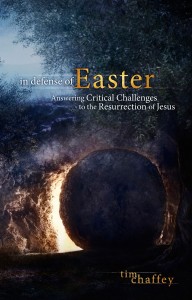
My book on the Resurrection, In Defense of Easter, details the overwhelming evidence for the Resurrection and critiques the alternative theories concocted by skeptics and critics over the past 2000 years. It is available here.
Another issue that was raised had to do with the Great Commission. At the Ascension, Jesus didn’t quote Matthew 28:18–20 so the film must have unnecessarily cut parts of the Great Commission. But the problem with this is that the film wasn’t quoting Matthew’s version of this command, which is alright since nothing in Matthew’s Gospel tells us that Jesus spoke these words right before He ascended. If I remember correctly, the film seemed to combine elements of Mark 16 and Acts 1 for its version of the Great Commission.
A more serious matter had to do with the one scene where Clavius gets to speak privately with Jesus. One person told me that they didn’t like it at all that Jesus asked, “What does your heart tell you?” Even if that were a problem, it isn’t accurate. In the film, Clavius comes to Jesus at night and is obviously humbled by being in his presence. He says something like, “I don’t even know what to say” (it may have been “to ask” at the end). Jesus responded by saying, “Speak your heart.” There is simply nothing wrong with such a statement.
I understand the sensitivity some conservative Christians have about this matter because so much of the world tells people to “listen to your heart” or “follow your heart.” Yet, many Christians will say that the Bible tells us that the heart is deceitful above all things and desperately wicked (Jeremiah 17:9). While I think this verse is often yanked from its context, which contrasts righteous and wicked people, I do believe we all have a sinful nature. However, I think we need to have a biblical balance on this subject. After all, it was Jesus who said that “a good man out of the good treasure of his heart brings forth good; and an evil man out of the evil treasure of his heart brings forth evil. For out of the abundance of the heart his mouth speaks” (Luke 6:45). This point deserves an entire blog post, so I’ll reserve discussion of that for another time. But if Jesus can speak of a good man who brings good treasure out of his heart and that it is from the abundance of his heart that the mouth speaks, then it isn’t wrong to have the character of Jesus to tell Clavius to speak his heart.
Claim #10: It does not clearly present the gospel
This is an interesting charge against the film because in a sense, it is both right and wrong. Paul told the Corinthians that the gospel he preached was “that Christ died for our sins according to the Scripture, and that He was buried, and that He rose again the third day according to the Scriptures.” The film shows in great detail that Christ died, was buried, and rose again. It does not elaborate that His death was for our sins, although it stresses His innocence, and Pilate mentions that it seemed Jesus wanted to be sacrificed. The centurion at the Cross was profoundly affected by what he witnessed and told Clavius about Jesus saying, “It is finished.” I don’t recall the movie using the word sin at all. I’ll listen for that the next time I watch it. So while the concepts are there, I believe the point could have been made stronger. Also, Bartholomew tells Clavius that Christ’s Resurrection means eternal life for all who believe.
Some people have said that Jesus should have said more to Clavius. That He should have helped him understand his own sinfulness and then clearly spelled out the gospel. Yet, where do we see Jesus do this in Scripture? In our day, we think of the gospel message as being very formulaic and that everyone should respond in the same or very similar manner. But if you read the Gospels, you’ll see that Jesus made quite a few statements that don’t fit neatly into our formulas. The same is true with the way people respond to the gospel—their reactions don’t always match what we expect. Sometimes people ponder the truth of the message for months or even years as the Holy Spirit works on their heart and mind. At this point in the film, Clavius was clearly humbled. He knew his own sinfulness, confessing to being party to the Crucifixion itself. In the film, Jesus tells him that He knows that, and He shows that He knew the desire of Clavius’ heart (“a day without death”). In a short time, Clavius had gone from a pagan praying to Mars, the god of war, to realizing that the Hebrew God, Yahweh, was the true God and was sitting right next to him in the person of Jesus.
The film ends where it began, a small inn or tavern, and Clavius has just told the owner his whole tale that we see in the film. The man asks if Clavius really believes everything he just told him. Clavius responds, “I believe. I can never be the same.”
So the film never walks the viewer through a modern gospel presentation that goes something like this:
The Bible tells us that we have all sinned and fallen short of the glory of God. If you think about your life, you know that you’ve sinned against God—that you’ve violated His commands. That’s sin, and our sin separates us from God. The penalty for sin is death and judgment. We can’t earn God’s favor through good works. We need His forgiveness so that we can be reconciled to Him. Jesus died on the Cross as a sacrifice for our sins; He paid our penalty, satisfying God’s wrath against sin, and then He rose from the dead. God forgives all who turn from their sins to Him in faith, trusting in what Christ did on the Cross for our sins.
We don’t see this sort of approach laid out in detail, but all of the elements are in the film. Furthermore, you won’t see this sort of approach clearly spelled out like this in Scripture, so why would we expect someone who is playing the role of a character in the first century AD lay out the gospel in the way many people do in 21st century America? I’m not saying those elements aren’t in the Bible. I’m simply pointing out that you won’t find Peter, Paul, or anyone else walking step-by-step through that type of approach.
Two More Brief Considerations
Despite what some people claim, this movie does not violate the second commandment (the law against making graven images and worshiping them). Actors are not graven images and people are not worshiping the film. And lest you think that the commandment forbade the Israelites from making any sort of graven image then you should read the description of the temple in 1 Kings 6.
The movie also gives a nod to the Shroud of Turin by showing an image of the Lord’s face on a long burial cloth. Some viewers may like this aspect while others will not. Regardless of what you believe about this cloth, the movie does not make it a major point of emphasis. And before you quickly dismiss it, as I had always done until about eight years ago, consider reading my post, The Ever-Intriguing Shroud of Turin, for more details.
Conclusion
While the film had some inaccuracies, I think some Christians have been overly critical of it. We are so used to Hollywood botching it when it comes to biblically themed movies that sometimes we are overly sensitive and overly critical of a movie that actually does an excellent job of being respectful to Scripture and the beliefs of Christians. Many of the criticisms of the film seem to be rooted in ignorance or pride: sometimes they are simply wrong and the film got it right, or the film depicted something in a way they didn’t like because they pictured it differently.
I’m afraid that it is too easy for some of us to bring a critical spirit to the table and blast anyone who doesn’t think about things in the exact same way that we do. I think we would all do better to approach these matters with some humility, check everything with Scripture (rather than our perception of what it actually says), and then treat fellow believers with some of the grace and patience God has shown us.
When it comes to this film, I would urge Christians to support it. It’s about time someone made a movie that handles the text as well as this one does and is as respectful toward Christian beliefs as Risen. Furthermore, the film spends nearly two hours focusing on the historical reality of the Crucifixion and Resurrection of Jesus Christ. I’ve been blessed all three times that I’ve watched it, and I’m confident I’ll see it a couple more times before it leaves theaters.



